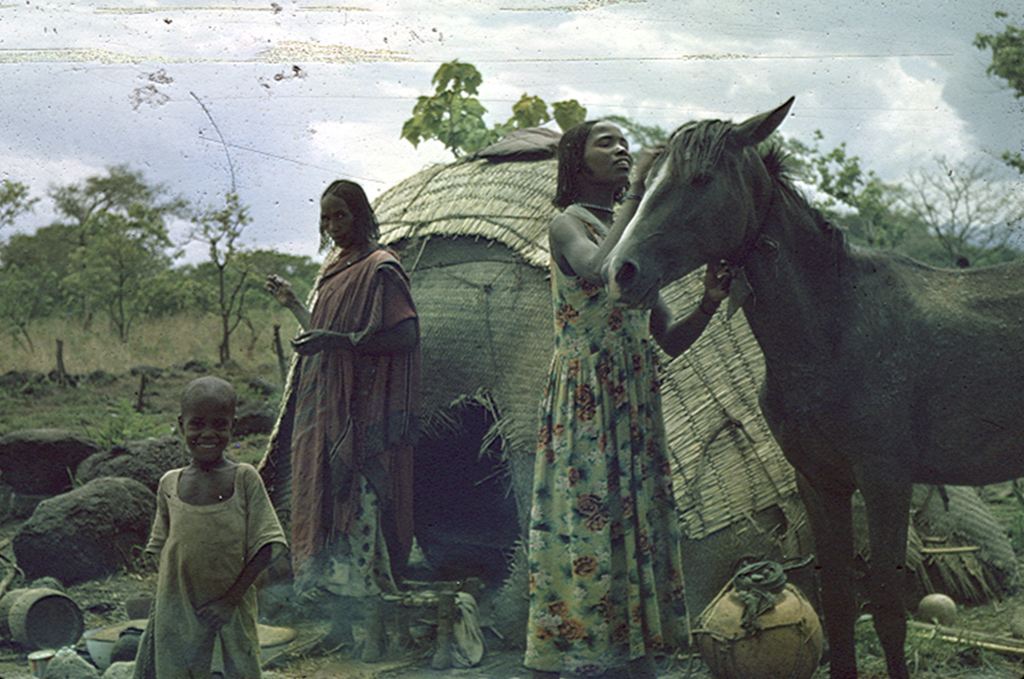The Deriba volcanic crater lake of the Jebel Marra mountain massive.
Jebel Marra, Western Darfur.
Photo: Gunnar Haaland, 1965
Weeding millets. During “beer-work parties” (Fur: “tawisa”, Arabic: “nafir”), an individual cultivator (man or woman) mobilizes neighbours (men and women) for work by serving them beer (Fur: “kira” Arabic: “merissa”) and sometimes some food. Refusal to accept an “invitation” is taken as an indication of an “unfriendly” relation.
Western foothills of Jebel Marra.
Photo: Gunnar Haaland, 1969
A big beer-work party (Fur: “Bambani”) arranged by a man to honour his mother in law (Fur: “iya mare”, Arabic: “naseeba”) by inviting a large group of people and providing them with ample amounts of beer (Fur: “kira”) and entertainment for those who participate in the work. One man is blowing on a kudu horn while another one is drumming.
Western foothills of Jebel Marra. Photo: Gunnar Haaland, 1969
A big beer-work party (Fur: “Bambani”) arranged by a man to honour his mother in law (Fur: “iya mare”, Arabic: “naseeba”) by inviting a large group of people and providing them with ample amounts of beer and entertainment for the participants in the work party.
Western foothills of Jebel Marra.
Photo: Gunnar Haaland, 1969
Two women winnowing millet (Fur: “sona”, Arabic: “dukhn”). Note the terraces for rainy-season cultivation in the background. Terraces in the Jebel Marra region are mainly used as a technique of soil conservation, and they are only to a very small extent used for dry-season irrigated cultivation.
Umu village, Jebel Marra, Western Darfur.
Photo: Gunnar Haaland, 1969
Men drinking beer (Fur: “kira”) during a break in communal house building. Beer is a product that the wife makes for her husbands from millets taken from his granary. It is shameful to sell millet beer. In daily context, men and women generally consume it separately. Otherwise it is used as a major way of mobilizing neighbours for individual undertakings like house building and weeding.
Umu village, Jebel Marra, Western Darfur.
Photo: Gunnar Haaland, 1969
In the western foothills of Jebel Marra small perennial streams allow for a limited amount of dry season irrigated cultivation. A woman harvesting a field of onions (Fur: “basala”, Arabic: “bassal”) that has been irrigated by the water channels in the foreground. In the background rise the western foothills of Jebel Marra.
Photo: Gunnar Haaland, 1966
A Fur woman is drumming next to the underground nests of flying ants (Fur: “simoa”). The sound produced by drumming is apparently a signal similar to rain-drops and entices the ants to come out of their nest. Fried flying ants are a favored delicacy in Jebel Marra villages.
Umu village, Jebel Marra.
Photo: Gunnar Haaland, 1965
A Baggara family outside their tent.
Western foothills of Jebel Marra, Western Darfur.
Photo: Gunnar Haaland, 1965

A couple of the Weila Fulani is setting up their tent towards the end of the rainy season. The Fulani nomads generally move into the Fur area before the Baggara Arabs and they are also the first to move southwards as the rain approaches.
Near Nyertete, Western foothills of Jebel Marra, Western Darfur.
Photo: Gunnar Haaland, 1965
A Fulani nomad of the Weila tribe is demonstrating his skills as an archer. The typical Fulani weapons are the bow and arrow, in contrast to the lance (Arabic: “shalaqaiya”) that is the typical weapon of the Baggara nomads.
Near Nyertete in the western foothills of Jebel Marra, Western Darfur.
Photo: Gunnar Haaland, 1965
Selling agricultural crops provides cash income for local Fur farmers. Most selling takes place at the weekly souq (Arabic for “market”), but sometimes in the home of a cultivator. In this photo, a Fur is selling millet (Fur: “sona”) to an Arab trader.
In a village of the western foothills of Jebel Marra, Western Darfur.
Photo: Gunnar Haaland, 1965
Beer plays a very important role in the life of the Fur, not only nutritionally but also symbolically. It is a major item in rituals that serve to indoctrinate ideas of solidarity among community members. To sell beer is considered an act similar to selling sex. Women who sell beer are thus considered like prostitutes (Fur: “azaba”). In this photo, Fur women from the village of Umu in Jebel Marra are engaging in such an “immoral” act (Fur: “ora”). Shameful sales used to take place at a distance from the central market space.
Umu village, Western Darfur.
Photo: Gunnar Haaland, 1965